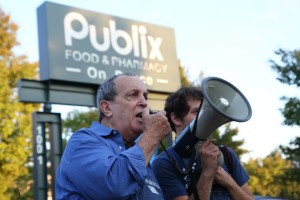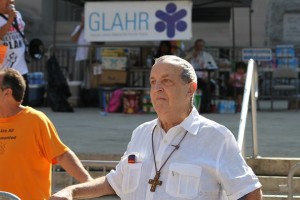Jorge Lawton, 1945 – 2014, !Presente!
By Anna Simonton, Staff Writer.
(APN) ATLANTA — Jorge Lawton, a tireless Atlanta activist and key player in Latin American progressive politics throughout his storied career as an interpreter, scholar, journalist, and high-level political analyst and advisor, died on Sunday, September 21, 2014, Atlanta Progressive News has learned.
Diagnosed with multiple myeloma five years ago, Lawton told APN in 2009 that his doctor had told him he only had six months to live, but he kept on living for five more years, attending one progressive activist event after another, as if living for an extended encore.
He continued to struggle with health problems, and developed kidney failure. On Monday, September 15, 2014, he checked himself into the emergency room at Emory University Hospital, where he lost consciousness and was put on life support. He was moved to hospice the following Saturday, and passed away Sunday morning.
 Born George Albert Lawton (later to change his name to Jorge Alberto Lawton) on February 03, 1945, he grew up in Connecticut and in Atlanta. During his junior and senior years of high school, he attended a school run by Benedictine Monks in Portsmouth, Rhode Island.
Born George Albert Lawton (later to change his name to Jorge Alberto Lawton) on February 03, 1945, he grew up in Connecticut and in Atlanta. During his junior and senior years of high school, he attended a school run by Benedictine Monks in Portsmouth, Rhode Island.
Lawton went on to earn a Bachelor of the Arts from Gonzaga University, and a Fulbright Scholarship to attend the Latin American Graduate School of Social Sciences in Santiago, Chile.
He completed a Ph.D in American Foreign Policy and Ethics at the Johns Hopkins School of Advanced International Studies in 1986.
In Chile, Lawton worked as a daily correspondent for London’s Financial Times newspaper, reporting on the coalition government of Socialist, President Salvador Allende.
Lawton also covered the opposition, including U.S. foreign policies that supported Chile’s 1973 coup, which brought about nearly two decades of dictatorship under Augusto Pinochet.
In the months following the coup, Lawton worked under U.S. Sen. Harold Hughes (D-IA), coordinating a Congressional conference that produced legislation that increased oversight of the U.S. Central Intelligence Agency, which had played a key role in the overthrow of Chile’s democratically elected leader.
In 1974, Lawton returned to Chile as an advisor to former Attorney General Ramsey Clark. In this role, he reported on the kangaroo trials of members of the Allende administration, and met with political prisoners and their families.
That same year, Lawton was appointed to serve as an analyst to the Church Committee, which was convened by the Select Senate Committee on Intelligence to investigate covert actions by U.S. government agencies.
The committee investigated and exposed some of the biggest governmental abuses ever made public, including assassination attempts on foreign leaders, and the FBI program COINTELPRO.
In D.C., Lawton also worked as an advisor to former Chilean Foreign Minister, Orlando Letelier, who was killed in a car bomb explosion orchestrated by Pinochet’s intelligence agents.
During this time, Lawton also worked as an interpreter for the U.S. State Department. Over the following decades he would serve as a diplomatic interpreter for the Mexican Presidency, President Jimmy Carter, Presidential Candidate Jesse Jackson, five Nobel Laureates, 16 heads of state, the Inter-American Commission of Human Rights, and various Congressional delegations, NGOs, trade unions, and universities.
In 1992, he founded Global South to North Communications, a network of conference interpreters and translators that provide services to partners in public health, human rights, and cultural arts.
In 1993, Lawton traveled to Haiti as a United Nations peace officer, where he monitored human rights violations under the post-coup military government of Raoul Cédras. Throughout the rest of his life he would accompany small delegations of international observers to human rights
conflict zones.
“There’s so much I could say about Jorge,” says Barbara Joye, who first met Lawton in 1992 and grew close to him through their mutual involvement in the Atlanta chapter of Democratic
Socialists for America.
“He was one of the most compassionate, loving people I’ve known. He was interested in everyone he met, from the busboy at the restaurant to President Carter. He dedicated himself to human rights, to cross cultural understanding between the people of Latin America and our
country.”
As a member of Atlanta’s activist community, Lawton was involved in planning the 2007 U.S. Social Forum and the 2012 Caravan for Peace. He was an active member of DSA.
But his influence spread across more than one particular project or organization. He was best known for lending support to seemingly every social justice cause.
“He loved to volunteer for progressive causes whenever he could––as a marshal at a demonstration, as an interpreter, sometimes as an organizer,” Joye says. “He would help anybody.”
Some Atlantans may never have met Lawton in person, but they know his voice. As co-host and commentator for WRFG’s bilingual program Beyond Borders, and its precursor Radio Diaspora, Lawton offered in-depth historical and political analysis on Latin America and the Caribbean.
“He shared his vast knowledge and talent as someone who had come into contact with key players in Latin American politics,” Sobukwe Shukura, co-host of Beyond Borders, told APN. “Sometimes he had so much information we had to reign him in. He researched for long hours to prepare for his commentary.”
Shukura says Lawton’s death came as a shock, even though he was well aware of Lawton’s health problems.
“We thought he was invincible. He was always on the case. Even when he wasn’t feeling great he would come in and contribute. He never stopped working,” he said.
Lawton shared his knowledge in the classroom too. Over the years he taught at the University of Maryland, the Graduate Center for Teaching and Economic Research in Mexico City, the National Autonomous University of Mexico, and Emory University. He also worked as an instructor for the
Department of State and the Foreign Service Institute.
As a senior fellow at the Southern Center for International Studies, Lawton authored “Privatization Amidst Poverty: Contemporary Challenges in Latin American Political Economy.”
Other platforms for Lawton’s astute writing included The Washington Post, The New Republic, and publications in France, Mexico, and Brazil. His last piece of writing is the second of a two-part series about the Chilean coup, published on DSA’s blog.
http://www.dsausa.org/1973_coup_in_chile_part_2
Lawton identified as Binational and considered Santiago, Chile his hometown. A lover of the arts, he was especially influenced by Latin American writers and poets like Pablo Neruda and Gabriel Garcia Marquez.
Marco Razo, an Atlanta artist and close friend of Lawton, first met him at a poetry event Lawton helped organize at Emory University years ago.
“He was very sensitive to art,” Razo says. “We would have long discussions on that subject matter.”
The two recently collaborated on organizing an art exhibit held in Razo’s home.
“He loved that kind of collaboration,” Razo says. “His spirit is with us now. He is in a different dimension, but his kindness and knowledge are going to be with us.”
Razo encourages folks to attend a poetry event on Saturday, September 27, 2014 at 6pm at Oakhurst Baptist Church. Lawton had planned on reading poetry there. Now, the event will be held in his honor.
Raised a Catholic and heavily influenced by liberation theology, Lawton was an active member of St. Paul’s Episcopal Church. He loved to sing, and was a member of St. Paul’s choir.
“He had a beautiful voice,” Joye said.
She recalls a DSA study group on the writings of Brazilian Popular Education theorist Paulo Freire, where Lawton talked about his personal relationship with Friere.
“He knew Paulo Friere, he knew Gabriel Garcia Marquez. He interacted with a lot of amazing people in his life. Some well known, but some who were just brave activists under dictatorial regimes. He touched so many people’s lives,” she says.
Lawton is survived by his two sisters, Paula Bevington and Elena Lawton de Torruella, as well as his stepmother, Nadine Lawton.
His friends and family are planning a memorial event to take place sometime in late October 2014.
(END/2014)
